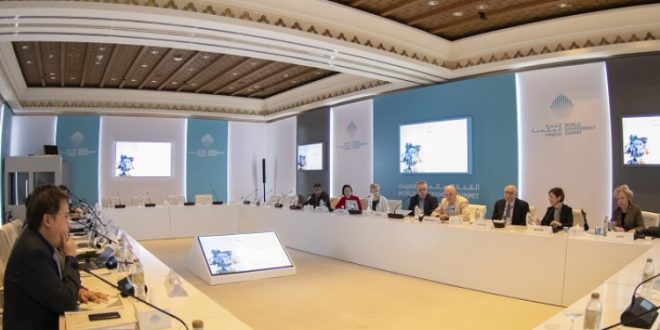The UAE led the development of a global data-sharing platform on the sidelines of the seventh World Government Summit (WGS 2019) today at the Global Data Commons roundtable.
The platform is set to use AI to tackle some of the world’s most pressing challenges through building on the immense volume of data available globally. The session emphasised the need for AI to be broadly available to both developed and developing countries, based on a robust ethical framework.
Speaking after the Global AI Governance Forum’s ‘Global Data Commons’ session, Omar bin Sultan Al Olama, Minister of State for Artificial Intelligence, said that AI will play a vital role in enabling the UN’s 17 Sustainable Development Goals (SDGs) through monitoring progress in achieving the SDGs, simulating implications of various measures taken, and providing recommendations for policymakers.
He added: “Policymakers and stakeholders here today are united in their view that AI has the potential to foster development on an unprecedented scale. But today’s sessions also highlighted the need to balance innovation and social protections when using AI. A common policy issue that emerged was the collection, handling and use of data, which is the foundation on which modern AI is built.”
According to a series of some 35 position papers from leading industry experts that were discussed at the Global Data Commons platform today, challenges that prevent the establishment of a global data commons (GDC) include access to quality data, technical problems, as well as legal and regulatory issues. According to an XPRIZE report: “We are faced with a daunting task of both mining all this data and applying it effectively in ways that could be beneficial beyond singular applications.”
AI has long formed a key part of the UAE’s vision for economic growth, innovation, development and human wellbeing, with the UAE Strategy for Artificial Intelligence launched in 2017.
In recent years, the country has emerged strongly as a global driver of dialogue around AI ethics, investment and research, and hosts the Artificial Intelligence for the UN Sustainable Development Goals (AI4SDG) Center in Dubai.
A key discussion point at the Global Data Commons roundtable was the fact that access to quality data remains the single largest stumbling block for the implementation of a global data commons. Although international businesses and government organizations collect vast amounts of data every day, it is generally kept in siloed technology systems and data stores that are largely incompatible with one another. Data commons will lower the barriers to data collection and sharing through facilitating collaboration across industries and disciplines.
Stakeholders also stressed the need to ensure that developing countries are not left behind in the rush to implement AI, and receive international support to develop their national capacities to process big data and produce their own solutions based on AI.
Attendees at the Global AI Governance Forum, around 250 international experts in total, included representatives of UNESCO, the Institute of Electrical and Electronics Engineers (IEEE), the Council on Extended Intelligence (CXI) and the Organisation for Economic Co-operation and Development (OECD), which has created the AIGO expert group to provide guidance in scoping principles for AI in society. The group comprises experts from OECD member countries and think tanks, business, civil society, and labor associations and other international organisations.
The World Government Summit 2019 will run from February 10 to 12 at Madinat Jumeirah in Dubai. The landmark event is set to convene more than 4,000 participants from 140 countries, including heads of state and governments, as well as top-tier representatives of 30 international organizations.
 UAE BARQ برق الإمارات – نبضك
UAE BARQ برق الإمارات – نبضك



